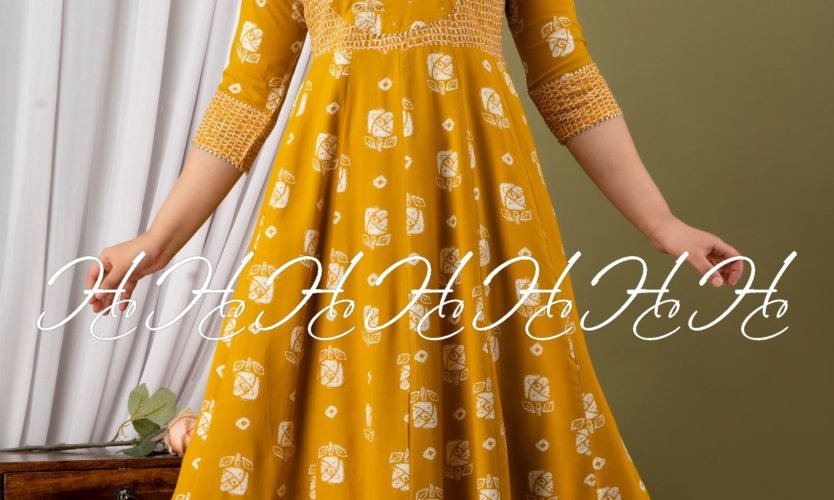How do Kurtis manufacturers ensure quality and fabric durability?
In the world of ethnic fashion, Kurtis have become a wardrobe staple for women across India and beyond. From casual cotton styles to elegant embroidered pieces, the demand for durable, comfortable, and stylish Kurtis continues to grow. But behind every beautifully designed Kurti lies the craftsmanship and commitment of a professional Kurtis manufacturer who ensures quality, precision, and lasting fabric performance. In this article, we’ll explore how manufacturers maintain the highest quality standards and ensure that every Kurti stands the test of time — especially when it comes from trusted sources like a Jaipur Kurti manufacturer wholesale supplier.
1. Selection of Premium Fabrics
The foundation of every high-quality Kurti begins with the fabric. Reputed Kurtis manufacturers prioritize selecting premium-grade materials such as pure cotton, rayon, muslin, silk, and georgette. These fabrics are known for their breathability, comfort, and strength. For example, Jaipur Kurti manufacturer wholesale suppliers are famous for using authentic Rajasthani cotton, which is lightweight yet durable — perfect for the hot Indian climate.
Before production begins, manufacturers test fabrics for color fastness, shrinkage control, and tear resistance. This ensures that customers receive Kurtis that retain their beauty and texture even after multiple washes. The careful fabric selection process not only enhances the overall look but also guarantees long-lasting wear.
2. Rigorous Quality Control at Every Stage
To ensure fabric durability and design consistency, every step of Kurti production undergoes strict quality control checks. A professional Kurtis manufacturer typically implements a multi-step inspection process — from raw fabric testing to final stitching.
- Pre-production inspection: Fabrics are checked for any defects, inconsistencies, or uneven dyeing.
- In-process inspection: Tailors and designers monitor each stage — cutting, embroidery, printing, and stitching — to maintain uniformity and precision.
- Post-production inspection: Each Kurti is carefully examined for stitching strength, accurate sizing, and flawless finishing before packaging.
This meticulous process minimizes product defects and ensures that customers receive Kurtis that are visually appealing and structurally durable.
3. Skilled Craftsmanship and Modern Techniques
Behind every premium Kurti is a blend of traditional craftsmanship and modern technology. Skilled artisans and tailors play a vital role in ensuring precision in embroidery, block printing, and handwork details. Simultaneously, advanced machinery is used for cutting, stitching, and dyeing to maintain accuracy and uniformity across large-scale production.
For instance, a Jaipur Kurti manufacturer wholesale supplier often integrates hand block printing techniques — a centuries-old Rajasthani art form — with digital printing for mass production. This fusion helps retain authenticity while maintaining production efficiency and consistency. Such craftsmanship ensures not only aesthetic appeal but also the longevity of each Kurti.
4. Attention to Stitching and Finishing
One of the most important aspects of a durable Kurti is its stitching quality. Even with the best fabric, poor stitching can cause tearing or shape distortion over time. Leading Kurtis manufacturers use high-quality threads and double-stitched seams to reinforce stress points such as sleeves, side seams, and hemlines.
Additionally, finishing touches like proper hemming, trimming loose threads, ironing, and labeling are performed to enhance the garment’s professional look. This attention to detail ensures that each Kurti is ready for long-term use without fraying or fabric damage.
5. Eco-Friendly and Safe Dyeing Processes
Fabric color plays a significant role in the beauty of a Kurti, but harsh chemicals can weaken fibers and reduce durability. Ethical Kurtis manufacturers now prefer eco-friendly dyeing techniques using natural or azo-free dyes. These dyes not only ensure vibrant, long-lasting colors but also preserve fabric strength and texture.
Jaipur Kurti manufacturer wholesale suppliers are particularly known for their use of vegetable dyes and natural pigments, which maintain the authenticity of Rajasthani prints while being gentle on fabrics. This commitment to sustainable practices also appeals to environmentally conscious buyers who value both quality and responsibility.
6. Testing for Durability and Comfort
Before reaching the market, many manufacturers conduct durability and comfort tests. These tests include checking for color bleeding, shrinkage, and resistance to pilling. The aim is to simulate how a Kurti will perform under real-life conditions — including washing, ironing, and daily wear.
Manufacturers often send fabric samples to specialized testing labs for tensile strength and abrasion resistance analysis. By ensuring the material can withstand stress without tearing or fading, Kurtis manufacturers reinforce customer trust and brand reputation.
7. Sourcing and Supply Chain Transparency
A key factor that influences Kurti quality is ethical sourcing. Reputed Kurtis manufacturers work closely with verified textile suppliers who maintain consistent fabric quality. Transparent sourcing ensures that every roll of fabric used in production meets durability and safety standards.
In Jaipur, many Kurti manufacturer wholesale networks collaborate directly with local weavers and artisans. This not only guarantees high-quality handcrafted textiles but also supports traditional craftsmanship and sustainable livelihoods.
8. Packaging and Storage Practices
Even after manufacturing, maintaining fabric durability depends on proper packaging and storage. High-quality Kurtis manufacturers use moisture-resistant packaging to prevent damage during shipping. Garments are folded carefully, and labels include washing instructions to help customers maintain the Kurti’s longevity.
Warehouses are kept clean, dry, and temperature-controlled to preserve the fabric’s integrity before distribution to retailers or wholesalers.
9. Customer Feedback and Continuous Improvement
Top manufacturers understand that customer satisfaction drives long-term success. By collecting feedback from wholesalers, retailers, and end customers, they continuously refine their designs, materials, and production techniques. This feedback loop helps address recurring issues, such as color fading or stitching inconsistencies, ensuring better products with every new collection.
A Jaipur Kurti manufacturer wholesale supplier, for instance, often updates its designs based on current fashion trends and customer preferences, while ensuring that fabric strength and comfort remain uncompromised.
Conclusion
Quality and durability are not achieved by chance — they result from consistent effort, advanced technology, and traditional expertise. From sourcing premium fabrics to adopting eco-friendly dyeing and conducting strict quality checks, every Kurtis manufacturer plays a vital role in crafting garments that combine beauty with resilience.














